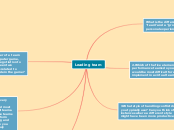Leading team
What is the difference between a "team" and a "group"? Describe your personal experience with each.
A team is a unit of two or more people who interact and coordinate their work to accomplish a shared goal or purpose for which they are committed and hold themselves mutually accountable
A team is a group of people, but the two are not one and the same. People who do not interact regularly, such as those waiting in line at the company cafeteria or riding together in the elevator, do not compose a team. Even a group of employees whose work is related is not a team unless the members share a common purpose that requires them to depend on each other
A team is
2.Which of the five elements of high-performance teams do you think would be most difficult for a leader to implement in a virtual team? Explain
1. A compelling purpose, clear objectives , and explicit metrics
2. A Diversity of skills and unambiguous roles
3. Streamlined team size
4. Decision Authority over how to achieve goals
5. Support and Coaching
3.What style of handling conflict do you typically use? Can you think of instances where a different style might have been more productive?
Dominating
Avoiding
Compromising
Accommodating
Collabrating
4. If you were the leader of a team developing a new computer game, how might you apply negotiation to resolve a conflict between two strong-willed members related to which features to include in the game?
Integrative Negotiation
Subtopic
Distributive Negotiation
